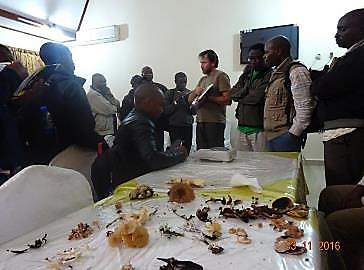 Implementation of the project funded by BELSPO to promote the international networking of federal scientific institutions, 2016 -2017 (closed)
Implementation of the project funded by BELSPO to promote the international networking of federal scientific institutions, 2016 -2017 (closed)
| Release date | 09/03/2018 |
|---|---|
| Contributor | mlsusini |
| Geographical coverage | R. D. Congo, Burundi, Rwanda |
| Keywords | mushrooms, networking |
This project was selected by Belgian Science Policy (BELSPO) in the context of strengthening the international networks of the Federal Scientific Establishments (ESFs), RBINS included. The global management was ensured by Dr Muhashy Habiyaremye (CEBIOS). The Botanic Garden Meise was involved as a northern partner and represented by Dr Jérôme Degreef, as the main supervisor of scientific tasks. The Southern beneficiaries were: UNIGOM, UOB, OBPE, UB, UR.
The 1rst of two workshops planed was organized in Goma (DRC) and in the PNVi from 1 to 6 November 2016. Twenty mycologists from Burundi, D.R. Congo and Rwanda participated. At this occasion (i) the functioning of the RMGL was formalized; (ii) methods to assess the productivity of edible mushrooms in the Great Lakes region of Africa were standardized.

The 2nd and final workshop was organised at the UNIGOM in June 2017 to synthetize the results of the project. The use of methods standardized to assess the availability of mycoflora in all the forests of the region inspired initiatives to test the domestication of wild mushrooms and to valorize them as food and / or source of income, this in accordance with recommendations from several local NGOs. The network comprises 68 members. The success of project became an asset of the acceptance by the “ARES” of a new and more important research and development project (2018-2022), which ensure durability of the former results of the network. It will not only complete inventories and ecology of edible mushrooms throughout the Albertine rift, but also determine their nutritional qualities as well as the monetary value. Under these criteria, the most interesting species will be tamed. A dozen representatives of local NGOs have joined the project in order to vulgarize the results.
Details regarding the whole BELSPO project, especially its achievements, are accessible at http://mycorgl2016.jimdo.com/programme and www.EFTA-online.org
 This site uses cookies in order to function as expected. By continuing, you are agreeing to our
This site uses cookies in order to function as expected. By continuing, you are agreeing to our 




